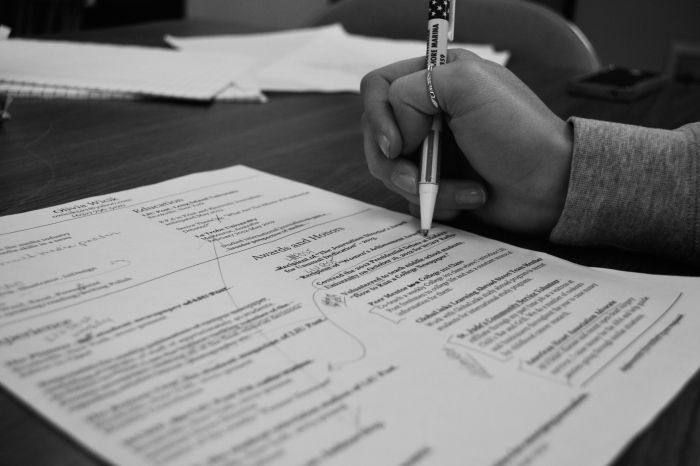Mimmi Montgomery Assistant Features Editor

Never more than one page, leave out unnecessary information, and god forbid – no typos. These are qualities that could catch the employer’s eye when looking at your resume. During the semester’s final Food For Thought lecture on April 16, three journalism professionals offered their expertise of do’s and don’ts when putting together job applications.
“Your resume is the most important piece of paper you’ll ever write,” said Bill Bleyer, a writer for Newsday, who was part of the Pulitzer Prize-winning team that covered the TWA Flight 800 crash in 1997. “Employers will lose interest and throw your resume in the trash if there are unnecessary mistakes,” he added.
Bleyer, along with Pam Robinson, Associate Regional Editor with Patch Huntingon, and Nicole B. Brewer, Executive Editor and Publisher for Hamptons.com, spoke about basic preparation techniques for finding a job in today’s challenging market.
The most effective resume should include and be arranged in the following order:
1. Your name and contact information; “I’ve seen resumes where people didn’t manage to spell their own names right, and that’s never a promising start,” Brewer said. “Also make sure to keep your contact information updated and your e-mail should sound professional, preferably it has your full name in it,” she added.
2. Objective: “Keep your objective very simple and concise. ‘Seeking an internship’ is enough,” Brewer said.
3. Experience: “List experience that is relevant to the internship and briefly explain what you did there,” Bleyer said. “If you worked at the Gap, list that, but cut out irrelevant job descriptions,” he added.
4. Education: List degrees, schools you’ve attended and add clubs, professional clubs, so- rorities, fraternities or volunteer work.
5. Skills: “Forget to write Microsoft Word, everyone knows that, and don’t claim to know Microsoft Office unless you do,” Brewer said. “Then I assume that you can build databases because that is part of Microsoft Office,” she said. “Language skills are great, but don’t over- estimate and say that you know Spanish fluently unless you do,” she added.
6. References: “Always ask the reference for permission first,” Robinson said. “I’ve had people calling, asking if I would recommend someone that I would not have recommended, which becomes awkward for me,” she added.
In addition, resumes should never be more than one page so that the reader does not lose interest. In the media industry, skills are im- portant, so be prepared to send links or actual copies of your work. “And remember, only work that you think is good enough, not all of your work,” Robinson said. Also keep in mind to start early; many summer internship applications should be done around Christmas. “At Newsday, we want them in as early as January,” Bleyer said.
Due to the lecture hall being double booked, the event ended early, but the speakers stuck around to offer advice and assist students who had brought their resumes with them.
“It was great to talk to professionals who helped me make changes that makes me attractive to employers when looking for a job,” said Maria Emdal Otterlei, a junior Broadcasting major. “I have taken LIU Post’s Coopera- tive Education EEE-1 Seminar, a non-credit course where you learn to write resumes, and they taught me very differently. I guess what I learned today applies much better to the field I want to work in,” she added.
Senior Journalism major Jazlyn Beltre, interned with Viacoms TV Land Digital and was offered a freelance position, but still agreed that her resume could be improved. “I learned that I repeat obvious things to make it look like I have more experience, and sometimes have to change the font to fit everything in,” she said. “I learned that less is really more,” she added.



Be First to Comment